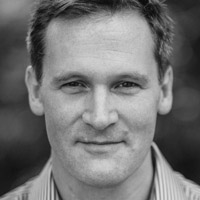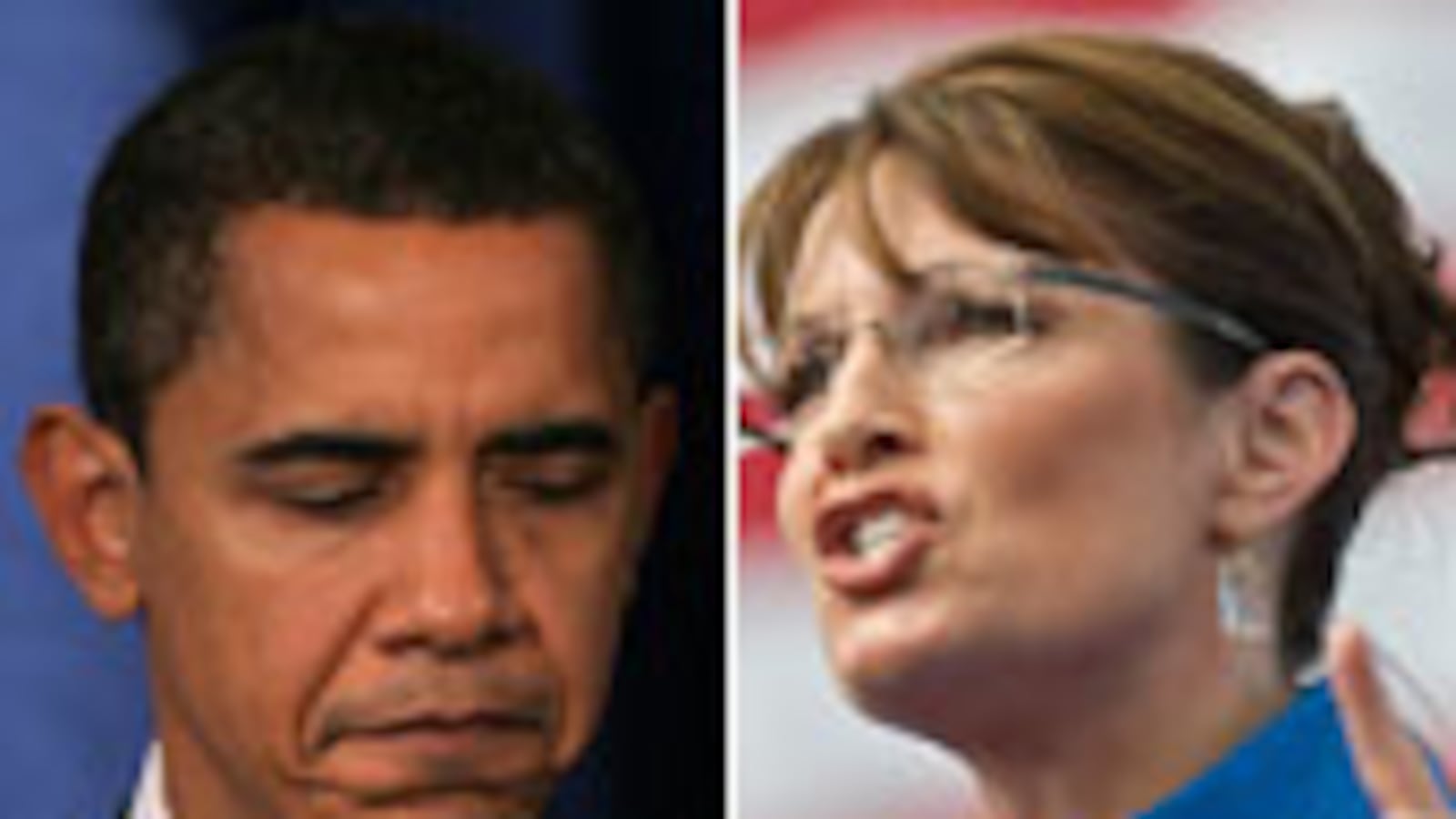“[W]e need a commander in chief, not a professor of law standing at the lectern.” That’s what Sarah Palin told Tea Partiers in Nashville last weekend, triggering uproarious cheers. A few weeks earlier, she had dismissed Obama’s State of the Union as “quite a bit of lecturing, not leading.” Meanwhile, John McCain just borrowed the “lecturer” line to attack Obama in the Financial Times.
Palin and her partners seem intent on turning one of Obama’s strengths—his thoughtfulness—into a liability. Such broadsides threaten to dominate political and policy debates not just in November’s mid-term elections, but the 2012 presidential election as well. The administration should take note and pivot quickly. The fact is that voters often need a bolder narrative, one whose plot turns on actions and victories, not just the calls to civil discourse and contemplation that have come to mark Obama’s presidency.
In a cage-match between nihilism and Niebuhr, who would you bet on? This all means Obama is going to need to fight—hard.
The intellectual has always held a hallowed, fraught place in American politics. In Saul Bellow’s novel Humboldt’s Gift, set in the 1950s, Bellow’s slightly ridiculous poet-hero Von Humboldt Fleisher showers praise on Adlai Stevenson, the “great souled” intellectual Democratic nominee for a president whose “chief of staff would know Thucydides.” “Intellectuals are coming up in this country,” Humboldt says. “Democracy is finally about to begin creating a civilization in the USA.”
The mirage of a “great-souled man” who can help “create a civilization in the USA” still promises water in the desert, particularly to progressives. It played a significant role in Obama’s stunningly inspiring 2008 campaign. But this vision also rubs a lot of people the wrong way. Since our nation’s beginning, many Americans have viewed overt intellectuals with suspicion and disdain, as memorably documented by the historian Richard Hofstadter in his 1963 volume, Anti-Intellectualism in American Life.
We all know that Obama was a law professor. He deeply believes the lawyer’s idea that a thesis, brought into conflict with antithesis, will result in synthesis: truth. As president, Obama has demonstrated unheralded courage in his repeated attempts to use politics to help lead toward truth, rather than just a win. You might call this the “philosophical model” of the presidency, and it dominated his State of the Union address.
One example was a passage meant to make people reflect on their own responsibility to counter pessimism with a sort of voluntary optimism. Obama said, “As one woman wrote me, 'We are strained but hopeful, struggling but encouraged.' … It is because of this spirit—this great decency and great strength—that I have never been more hopeful about America’s future than I am tonight. . . . And tonight, I’d like to talk about how together, we can deliver on that promise.” Note that he says, “I’d like to talk about.” It’s as if Obama is inviting us to reason together. This is what Palin attacks as a “lecture.”
Obama has made plain his aversion to trumpeting truths as if they were absolutely right. He spoke frequently during the campaign about the Christian philosopher and activist Reinhold Niebuhr, who wrote of the importance of doubt in politics, rooted in original sin and our fallen state. In 2007, when asked about Niebuhr by the columnist David Brooks, Obama said, “I take away the compelling idea that there’s serious evil in the world... We should be humble and modest in our belief we can eliminate these things, but we shouldn’t use that as an excuse for cynicism and inaction.” Deliberation has played a real role in this presidency. As president, for instance, Obama has asked advisers to stage “mini-debates” in the Oval Office, on tough issues such as releasing the CIA’s “torture memos.”
Yet, to his many critics, Obama’s philosophical commitment to humility has seemed less like an admirable temperament and more like tentativeness or, worse, a refusal to act. Temperateness becomes temporizing; lessons become lectures; debate becomes domineering. True, Obama’s greatest rhetorical successes have also been his most reflective—the campaign’s “race speech” about Jeremiah Wright, Obama’s Oslo speech reconciling the Nobel Peace Prize with his deployment of 30,000 additional troops to Afghanistan. But both of these speeches were also retrospective—explaining events in the past, rather than policies in the future. They were not, in other words, about action.
The real question is whether dialectical reasoning can ever be the rule, rather than the exception. When your opponents have an undivided commitment to power for power’s sake, they can eat you alive. In her Tea Party speech, Palin dismissed two years’ worth of campaigning on hope and change as that “hopey changey stuff.” Senator Jim DeMint (R-SC) famously promised that Republicans would make health care Obama’s “Waterloo.”
These attacks echo a tradition of nihilistic, scorched-earth tactics against progressives, from Richard Nixon’s “Southern strategy” to the savage politics pioneered by Reagan and Bush campaign manager (and then RNC chairman) Lee Atwater, responsible for the Willie Horton ads that took down Michael Dukakis. The trend continued through the tactics of former Republican House Majority Leader Tom “The Hammer” DeLay and the lies the Swift Boat Veterans for Truth told about 2004 Democratic nominee John Kerry’s Vietnam War record, and up through the 2008 deceits that Barack Obama “started his campaign in the living room of a domestic terrorist,” and was not born in the United States—and Palin’s false assertion that Obama’s health-care plan included “death panels.”
In a cage-match between nihilism and Niebuhr, who would you bet on? This all means Obama is going to need to fight—hard. At the National Prayer Breakfast, he appealed—yet again—to our better angels, promising that if we “talk to one another openly and honestly, then perhaps old rifts will start to mend and new partnerships will begin to emerge.” Perhaps. But in the coming months, Obama will need to elevate our politics not discursively—not by talking about it all the time—but through action. Through winning. He should take a page from across the aisle and invoke the historic image from Teddy Roosevelt’s great speech at the Sorbonne in Paris in 1910, where he extolled the “man in the arena… whose face is marred by dust and sweat and blood.”
The president has a story to tell about action, about victories. As John Judis recently reported in the New Republic, he has repudiated years of failure of regulation on the environment, occupational health, and securities oversight, and mightily turned the nation in a new direction. With the stimulus bill, he took on foes, defying an even-worse recession. He has taken on his critics to engage with the peoples of the world, and Iran’s regime falters. He has decapitated cell after cell of al Qaeda and Taliban with both drones and intelligence. On Afghanistan, he has united thought and action in a brave and controversial new direction.
Thought and action are not mutually exclusive; at their best, they entwine, like a strand of DNA. While Roosevelt praised action and risk-taking in his Sorbonne speech, he also counseled elevating politics itself. “Therefore it behooves us to do our best to see that the standard of the average citizen is kept high,” Roosevelt said, “and the average cannot be kept high unless the standard of the leaders is very much higher.”
Thoughtful statesmen are an unquestionable good. But if all those long silences in the State of the Union only gave schemers more time to kill President Obama’s proposals, then all we’ll be left with is an exhibit of a beautiful mind. We need the president in the ring, not above it. We need to see a little of that dust and sweat and blood. We need to see him fight. And we need to cheer—once again—for him.
Mike Signer is a Virginia-based lawyer, an adjunct professor at Virginia Tech, and a senior fellow at the Progressive Policy Institute. He is the author of Demagogue: The Fight to Save Democracy from Its Worst Enemies (Palgrave Macmillan 2009). In 2009, he was a candidate for the Democratic nomination for lieutenant governor of Virginia.






